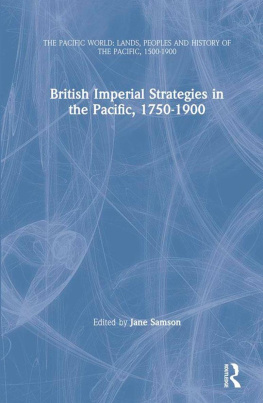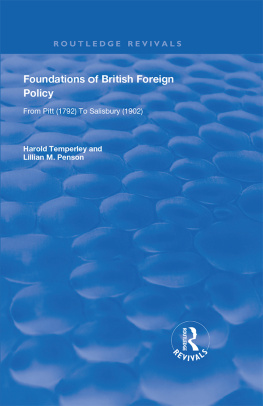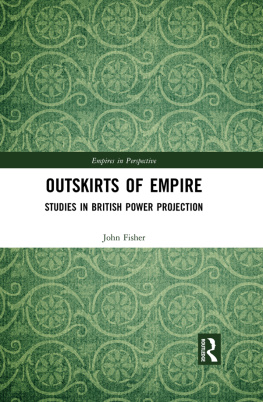
Lord Salisbury and Nationality in the East
This study explains how Salisbury viewed cultural conflicts between the East and the West, how he treated Oriental nationality and nationalist aspirations in British dominions in the East, and how he directed British policy in the Eastern world in a time when the Western Powers were plunging into a struggle for spheres of predominance. In pursuit of British imperial interests, Salisbury was outwardly determined, but acutely aware of the inherent moral conflicts. He understood that the expansion of Europe was inevitable, but, taking into account the rights and feelings of the Eastern nations, he endeavoured to reduce his countrys impact on the peoples subjected to British control. Hence his preference for the generally peaceful invasion effected by informal empire. Following an introductory discussion on Salisburys ideas and policy, particularly in the light of his treatment of nationality, this research investigates his record in India, Turkey, Egypt, and China to argue for a strikingly sympathetic attitude in his dealings with Eastern nationalities. While it is a truism to say that British imperialism was coloured by Christian beliefs and liberal principles, it has not yet been appreciated how far Salisbury succeeded in reconciling the moral and practical demands of Western civilization upon itself with the requirements of power.
Shih-tsung Wang is Professor of History at National Taiwan University.
Routledge Studies in the Modern History of Asia
The United States and Southeast Asian Regionalism
Collective Security and Economic Development, 194575
Sue Thompson
Japans New Deal for China
Propaganda Aimed at Americans before Pearl Harbor
June Grasso
Voices of the Korean Minority in Postwar Japan
Histories Against the Grain
Erik Ropers
Germanys Colony in China
Colonialism, Protection and Economic Development in Qingdao and Shandong, 18981914
Fion Wai Ling So
Conflict, Community, and the State in Late Imperial Sichuan
Making Local Justice
Quinn Javers
China in Australasia
Cultural Diplomacy and Chinese Arts since the Cold War
Edited by James Beattie, Richard Bullen and Maria Galikowski
Hagi A Feudal Capital in Tokugawa Japan
Peter Armstrong
Lord Salisbury and Nationality in the East
Viewing Imperialism in its Proper Perspective
Shih-tsung Wang
For a full list of available titles please visit: www.routledge.com/Routledge-Studies-in-the-Modern-History-of-Asia/book-series/MODHISTASIA
Lord Salisbury and Nationality in the East
Viewing Imperialism in its Proper Perspective
Shih-tsung Wang
First published 2019
by Routledge
2 Park Square, Milton Park, Abingdon, Oxon OX14 4RN
and by Routledge
52 Vanderbilt Avenue, New York, NY 10017
Routledge is an imprint of the Taylor & Francis Group, an informa business
2019 Shih-tsung Wang
The right of Shih-tsung Wang to be identified as author of this work has been asserted by him in accordance with sections 77 and 78 of the Copyright, Designs and Patents Act 1988.
All rights reserved. No part of this book may be reprinted or reproduced or utilised in any form or by any electronic, mechanical, or other means, now known or hereafter invented, including photocopying and recording, or in any information storage or retrieval system, without permission in writing from the publishers.
Trademark notice: Product or corporate names may be trademarks or registered trademarks, and are used only for identification and explanation without intent to infringe.
British Library Cataloguing-in-Publication Data
A catalogue record for this book is available from the British Library
Library of Congress Cataloging-in-Publication Data
Names: Wang, Shih-tsung, author.
Title: Lord Salisbury and nationality in the East : viewing imperialism in its proper perspective / Shih-tsung Wang.
Description: Abingdon, Oxon ; New York, NY : Routledge, 2019. | Series: Routledge studies in the modern history of Asia ; 143 | Includes bibliographical references and index.
Identifiers: LCCN 2019008697 | ISBN 9780367178130 (hardback) | ISBN 9780429057809 (e-book)
Subjects: LCSH: Salisbury, Robert Cecil, Marquess of, 18301903Political and social views. | StatesmenGreat BritainBiography. | Prime ministersGreat BritainBiography. | Great BritainForeign relations18371901. | Great BritainForeign relationsAsia. | AsiaForeign relationsGreat Britain. | Great BritainColoniesAsiaHistory19th century. | Great BritainPolitics and government18371901. | ImperialismHistory19th century. | East and West.
Classification: LCC DA564.S2 W36 2019 | DDC 303.48/24105dc23
LC record available at https://lccn.loc.gov/2019008697
ISBN: 978-0-367-17813-0 (hbk)
ISBN: 978-0-429-05780-9 (ebk)
Typeset in Galliard
by Apex CoVantage, LLC
For souls troubled by the meaning of life
Contents
This study is aimed at examining and explaining how Salisbury viewed cultural conflicts between the East and the West, how he treated Oriental nationality and nationalist aspirations in British dominions in the East, and how he with a subtle intellect, religious bent, and humane consideration directed British policy in the Eastern world in a time when the Western Powers were plunging into a struggle for spheres of predominance.
The impression that Salisbury in his foreign policy had little regard for nationality or nationalism is a misapprehension owing to neglect of his extraordinary character and his moral sense. In pursuit of British imperial interests, he was outwardly determined, but acutely aware of the inherent moral conflicts. He understood that the expansion of Europe was inevitable, but, taking into account the rights and feelings of the Eastern nations, he endeavoured to reduce his countrys impact on the peoples subjected to British control and influence. Hence his preference for the generally peaceful invasion effected by informal empire; hence, too, his promotion of reform programmes in the Oriental countries based on European values. So far as British domination in the East was concerned, Salisbury favoured native rule and indirect control, in contrast to many leading politicians in the latter part of the nineteenth century who were in sympathy with imperial enterprise. Salisbury, of course, was an imperialist, but a reluctant and evidently a troubled imperialist.
Following an introductory discussion on Salisburys ideas and policy (Ch. I), particularly in the light of his treatment of nationality, this research investigates his record in India (Ch. II), Turkey (Ch. III), Egypt (Ch. IV) and China (Ch. V) to argue for a strikingly sympathetic attitude in his dealings with Eastern nationalities (Ch. VI).
The approach adopted involves a review of policy in these areas to bring out his concern to respect, as far as possible, the collective personality of subject people. While it is a truism to say that British imperialism was coloured by Christian beliefs and liberal principles, it has not yet been appreciated how far Salisbury succeeded in reconciling the moral and practical demands of Western civilization upon itself with the requirements of power.










